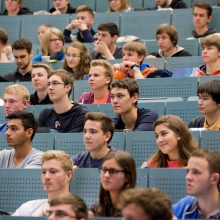Dr. Andreas Yiotis from the National Centre of Scientific Research (NCSR) Demokritos (Greece) will give a lecture on 22nd January 2019, entitled: "Effective steady-state flow regimes during the stranding and mobilization of NAPL ganglia within stochastically reconstructed porous domains".
Abstract
We study the flow dynamics of Non Aqueous Phase Liquid residuals within stochastically reconstructed porous domains over a typical range of Capillary, Ca, and saturation, Snw, values where both mobile and stranded ganglia coexist. Using an elaborate Lattice-Boltzmann immiscible two-phase flow simulator, we monitor the dynamics of mass re-partitioning between the mobile and stranded ganglia populations at the pore scale and at steady-state flow conditions, i.e. when the volume-averaged phase velocities and ganglia size distributions reach an ’apparent’ dynamic equilibrium state (starting from a sufficiently disordered initial size distribution). Our analysis reveals the existence of a Non-Darcy flow regime, spanning over a non-trivial range of Ca values, where the non-wetting phase flux, unw, is a linear function of the non-wetting phase saturation (for Snw<0.4) and exhibits a power-law dependence on the applied body force difference (Bo−Boc). We show that this regime is related to the gradual mobilization of stranded ganglia and the formation of new two-phase flow paths that are increasing in number as the body force, Bo, increases above a clearly identified threshold value, Boc (which is independent of Snw). Our study also focuses on the size and velocity distributions of mobile and stranded populations at steady-state. Both populations exhibit distinct statistical characteristics which evolve with Bo in the capillarity-dominated regime.
Date: 22nd January 2019
Time: 5 pm
Place: MML U1.003, Pfaffenwaldring 61, Campus Vaihingen


